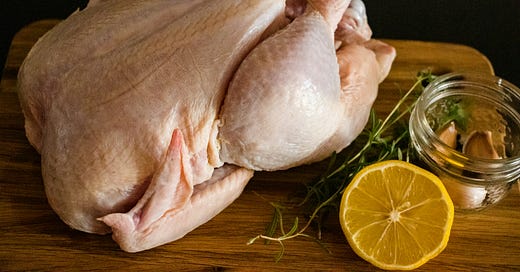Why are recipe sites so often filled with long, meandering stories? Do these food bloggers think that I am Googling “how to cook chicken thighs oven” on a Tuesday night because I want to read a long anecdote about the aroma of your grandmother’s kitchen? Sorry, but in the personal essay business we tend towards this harsh critique: who cares?
The internet has placed this food blogger and me in a transactional situation: she has the answer I need. Instead of calling my mom or consulting a cookbook, I have turned to Google, hoping for quick, free, frictionless information. Meanwhile, the blogger has painstakingly detailed this recipe, along with lovely photos, carefully edited anecdotes, and well-tested tips, all of which I am scrolling past at breakneck speed in search of the two bits of data I need: 400°, 40 minutes.
I think it was in the book Freakonomics that I learned that most drug dealers don’t make any money. According to Team Freakonomics, you’d get a better ROI working at McDonald’s. Drug dealing is, essentially, a pyramid scheme. The internet is much the same—while a majority of Gen Z respondents listed “influencer” as their most desired profession, only .3% of YouTubers earn $5,000 or more per month. Substack actually considers you a “bestseller” at 100 paid subscribers. Supposing these subscribers are all paying the standard rate of $8/month ($6.63 of which goes to the author) bestseller status would mean an author income of $663/month, or $7956/year. And that’s before taxes.
The other night I was driving my 12-year-old to confirmation class when we got on the subject of my previous career as an actress. “Were you any good?” he asked. (Ah! The question that once haunted my nightmares!) “I was fine,” I replied. “But there are so many people who want to be actors, that if you want to be successful, you need to be really good, really hot, really lucky, or, most likely, related to a famous person.” And it’s not just actors; in this age of increasing economic stratification, success often feels out of reach for all but the nepobabies among us. Enter the internet with its illusion of democratization. On social media, anybody can become famous, right?
“[these are] the values of the attention economy, which have trained so many of us to measure our worth using crude, volume-based matrixes. How many followers? How many likes? Retweets? Shares? Views? Did it trend? These do not measure whether something is right or wrong, good or bad, but simply how much volume, how much traffic, it generates in the ether.” —Naomi Klein, Doppelganger (emphasis mine)
One of my most embarrassing secrets: I really believed I would be famous by now. But at 40, I’m too old to be a starlet or a wunderkind. In a culture that idolizes fame above goodness, what does it mean to embrace the ordinary? To accept that our destiny might have more to do with washing dishes and talking on the phone than inspiring millions or igniting the revolution?
“When Lilly Singh announced that she was taking a hiatus from YouTube in 2018, she explained that the platform ‘is a machine, and it makes creators believe that we have to pump out content consistently even at the cost of our life.’ A machine, in other words, that turns people into machines.” —Naomi Klein, Doppelganger
I think Hannah Arendt would find this humans-mimicking-machines pattern alarming. Arendt coined the phrase “the banality of evil” after covering the trial of Nazi Adolf Eichmann. Arendt took pains to point out that Eichmann was not motivated by antisemitic hatred, rather, that he performed his evil acts under the gloss of duty and a desire to get ahead professionally. Eichmann, in effect, had compartmentalized his actions, refusing to think through their consequences. Instead, this architect of Hitler’s “final solution” thought of himself as just a part of the Nazi machine.
None of this is to allege some kind of food-blogger-to-Nazi pipeline. Obviously not. But in our age of algorithms and AI, we must constantly fight for our humanity. We must block out so much noise just to hold onto our own values. We must see ourselves not as brands and profiles, not as our numbers of followers and sponsorships, but as humans, perhaps even as co-creators alongside God.
We bear not only the ability to create, but responsibility for our creations.
It’s not that I am an uncaring person. If you were here, dear food blogger, standing next to me as I prepared these chicken thighs, I’m sure I’d enjoy hearing about your grandmother. But maybe my opinion doesn’t matter, anyway. Write about her, if it makes you happy. Resist my desire to turn you into a means-to-an-end, two single data points, rather than a whole person.
Article voiceover
Discussion about this post
No posts





I feel you! On all this stuff. Nicely done.
I never signed up to be an agent of “traffic in the ether”